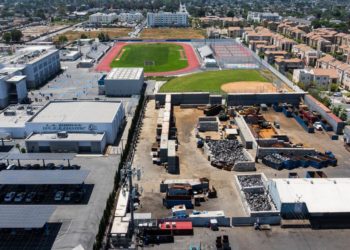Late last week, before the U.S. strikes on Iranian nuclear targets, Shaheen Samadi sat inside the minimalist dining room of Azizam restaurant in Silver Lake, sipping ceylon tea with cardamom, a drink that reminds him of the tea he grew up drinking.
Born in Connecticut to parents who immigrated to the United States after the Iranian Revolution in 1979, Samadi moved to L.A. in hopes of connecting with its Persian diaspora community — the largest in the world outside Iran. Samadi, who describes himself as “your friendly neighborhood Persian rapper,” has long criticized the Iranian regime in his music. All last week, he has felt terrified and angry as Israel and Iran traded deadly attacks.
“Right now, the entire Iranian diaspora community is in this weird phase of fight or flight and crippling anxiety,” said Samadi, sitting near the Azizam counter as servers walked back and forth with plates of barbari bread and khoresht. “We like to see [the Iranian regime] getting killed. What we do not like is the casualties that come with it.”
Azizam — which Times restaurant critic Bill Addison recently named one of the 101 best restaurants in California — began hosting complimentary tea and backgammon on its cozy Sunset Boulevard-facing patio in hopes of providing Iranians with a safe space to relax and come together. As Samadi explained, “most people, their bodies are filled with blood — with us Persians, it’s tea.”
“Whether you are full, half or a fraction, you are still Iranian,” read the restaurant’s Instagram post Wednesday. “Azizam was born to celebrate that and our doors are open to all.”
Local Iranians all week have been finding solace in restaurants like Azizam and neighborhoods such as L.A.’s Tehrangeles, which are providing much-needed spaces to commune with their culture. While many of them fear for their families and friends in Iran, they also have hope that, as Iranian Americans, they can bridge a decades-long divide.
Sal Mousavi, who visited Azizam for the first time Thursday, said that many of the menu items “remind me of home” and that the event helped him “focus on something else other than what’s going on.”
Like many Iranian Americans in L.A., Samadi doesn’t condone the leadership of Iran, which his parents fled the country to escape. But he said that Persians in the United States still remain divided over the escalating conflict between Iran and Israel, and now the United States.
“I hate to say it, but it doesn’t feel like a community,” Samadi said of the Persian diaspora in L.A. “We’re not united. We all have very strong opinions about things.”
Since June 13, Israel has launched airstrikes on Iran that have killed at least 657 people. Iran immediately retaliated with airstrikes that have killed at least 24 people in Israel, including one that hit a hospital in southern Israel on Thursday.
The United States entered the conflict Saturday with strikes on Iranian nuclear facilities, authorized by President Trump.
“Many Iranians, especially those who are living here in L.A. and are living in diaspora, are deeply dissatisfied with the current regime,” said Peyman Malaz, chief operating officer of the PARS Equality Center in Sherman Oaks, a nonprofit that supports Persian immigrants. “But of course, war is war … So what we are hearing from the community is feelings of fear and anxiety, and also uncertainty.”
Adrian, who declined to give his last name, immigrated to L.A. from Tehran in 2011. He came to Azizam, which he described as a restaurant that serves the “Persian dishes that only your mom makes at home,” for backgammon and an albaloo or sour cherry spritz.
“My mind is very preoccupied, I can barely sleep at night,” said Adrian, who has family living in Tehran. “Just seeing the names of all the neighborhoods that I grew up in … all these places, they’re being bombed. It’s just so surreal. It feels like a dream — more like a nightmare.”
Meanwhile in Tehrangeles — the Persian neighborhood in Westwood that became a hub in the ’80s for immigrants fleeing the Iranian Revolution — shop owners report feelings of fear among their Persian customers.
“They are very worried right now,” said Ali Perkdas, the owner of Super Sun Market, a Persian grocery store that opened its doors more than 20 years ago. “[The Iranian government] cut the internet, so they cannot reach their family or friends.”
Laila Massoudnia, who recently moved to L.A. from the Bay Area, said that she was struck by the welcoming, supportive communities she found.
“If anything, with all the events that have happened in the past week, I’ve seen so much of a united front here, regardless of whatever background we come with,” Massoudnia said. “I didn’t grow up in a community with a lot of Iranians in America, and so just to have that means the world. It doesn’t make me feel alone. And I know a lot of Iranians, internally and externally, are feeling very, very isolated and alone.”
Many Iranian Americans are hoping for a peaceful resolution abroad. Massoudnia emphasized that Iranians — a group of people she described as “all about love” — have the same concerns as practically any other American, even in times of war.
“No one wants to be born in the pathway of missiles and bombs,” Massoudnia said. “These are people with aspirations, with dreams, with hopes, who wake up every day, go to work every day … want their kids to go to university and become educated … They have the same exact struggles as every single thought that’s ever passed any American or any other person’s mind.”
The post As war spreads, local Iranians finding familiar comforts in L.A. Persian restaurant appeared first on Los Angeles Times.




